Don’t hand a blank check to a troubled FDIC
When shocking reports surfaced recently of discrimination, harassment and a toxic workplace culture at the Federal Deposit Insurance Corporation, members of both parties in Congress called for holding FDIC leadership accountable. Yet even before the investigations are complete and any disciplinary measures have been taken, some are pushing to ram through legislation giving the FDIC massive new powers without a scintilla of accountability.
Senate Banking Committee Chairman Sherrod Brown (D-Ohio) led a letter with Senate Democrats calling for the FDIC to investigate and remove wrongdoers within the agency. The letter states that “allowing employees that have engaged in misconduct to stay on the job … compromises public trust in the FDIC.” Yet in his opening statement this month at a committee hearing, Brown still pushed the Senate to pass a bill that would boost the FDIC’s powers while the alleged FDIC miscreants are still on the job and the investigation is unfinished.
In July, in response to high-profile failures at Silicon Valley Bank and First Republic Bank, the Senate Banking Committee approved the RECOUP (Recovering Executive Compensation Obtained from Unaccountable Practices) Act in a bipartisan vote. The bill massively increases the FDIC’s powers to remove the leadership of any U.S. bank it supervises, and it does so even if the agency doesn’t deem a bank at risk of failure.
Progressive activist groups are pushing Congress to pass the measure, and there may be efforts to add it to must-pass bills during budget negotiations in the final days of December and into early next year. Brown declared at the hearing that “we need to pass the bipartisan RECOUP Act, to hold failed bank executives accountable for driving their banks into the ground.”
Supporters of the RECOUP Act such as Brown argue it is needed to hold executives accountable at large banks and rein in risky practices that may lead to a bank’s failure. Yet while the clawbacks for executives at banks with assets of more than $10 billion have gotten the most attention, the bill massively increases the FDIC’s powers to remove the leadership of any U.S. bank it supervises — and it does so even if the agency doesn’t deem a bank at risk of failure.
Read the full article on The Hill.
